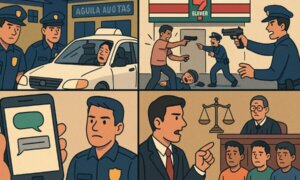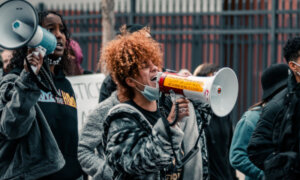FACTS
The United States Immigration and Customs Enforcement (US ICE) informed PSI Macatangay, Chief of the Regional Anti-Human Trafficking Task Force of Region 7, about the activities of “Eula Rodriguez,” later confirmed to be Eul Vincent O. Rodriguez (Rodriguez), who was allegedly engaged in human trafficking through online platforms. PO3 Gambi was assigned to investigate and created a decoy Facebook account, “Tristan James,” to interact with Rodriguez.
Over several online interactions via Facebook and Skype (where Rodriguez used accounts like “sofia.negra” and “cassandra.labajo”), Rodriguez solicited money from PO3 Gambi (posing as “Tristan James”) and offered nude shows involving minors. PO3 Gambi documented these communications, including instances where Rodriguez showed the faces of two young girls and later had them perform an explicit show, which PO3 Gambi recorded before stopping it.
Based on these interactions, an entrapment operation was planned. PO3 Gambi, still as “Tristan James,” informed Rodriguez that a foreign friend, “Kyle Edwards” (a role to be played by a confidential informant, CI), was at the Waterfront Hotel. Rodriguez offered to meet “Kyle Edwards” and bring a 14-year-old minor, AAA263603 (also known as “Tosip”), to perform a nude show and potentially engage in sexual acts in exchange for money, part of which was requested for fare. Rodriguez confirmed receiving PHP 2,500.00 sent for this purpose.
At the hotel, SPO1 Timagos, acting as the CI’s driver, was present when the CI handed the marked money to Rodriguez in Room 1137, where AAA263603 was also present. Upon Rodriguez’s receipt of the money, SPO1 Timagos signaled the team, leading to Rodriguez’s arrest. The marked money was recovered from Rodriguez, and his hands tested positive for fluorescent powder. AAA263603 was rescued and turned over to the DSWD. Examination of Rodriguez’s phone revealed messages consistent with the operation, and AAA263603 later testified to performing approximately 20 online shows for Rodriguez in exchange for small sums of money.
Rodriguez denied the allegations. He claimed he only brought AAA263603 to the hotel to eat pizza with the foreigner and that he was instigated. He further argued that the chat logs and videos were inadmissible as they violated his right to privacy and were obtained without a warrant, and that the money from the entrapment was forced upon him. The trial court found him guilty of qualified trafficking in persons, a decision affirmed by the Court of Appeals, leading to the present appeal before the Supreme Court.
The People, through the Office of the Solicitor General, contended that Rodriguez’s guilt for qualified trafficking in persons was proven beyond reasonable doubt. They maintained that the operation was a valid entrapment, not an instigation, as the criminal intent originated from Rodriguez. The prosecution asserted that the chat logs and videos were legally obtained as part of a legitimate police investigation and did not violate Rodriguez’s right to privacy, especially since he used public platforms for illicit activities. They further argued that Rodriguez’s denial was a weak defense, unsubstantiated by evidence, and could not overcome the positive testimonies of the prosecution witnesses and the physical evidence gathered.
Rodriguez argued that his arrest was illegal because it was an instigation, not an entrapment, initiated by the police. Consequently, he contended that the evidence recovered from him was inadmissible. He further posited that the trial court erred in relying on the chat logs and videos, asserting these were “extraneous evidence” obtained in violation of his constitutional right to privacy of communication and Republic Act No. 4200 (Anti-Wiretapping Act). Finally, he claimed the prosecution failed to prove all the elements of qualified trafficking because, among other reasons, none of the prosecution’s witnesses had personal knowledge of the alleged initial illicit conversations between him and the CI, and that the money was forced on him. He maintained his denial of the accusations.
ISSUES
- Whether or not Rodriguez was instigated to commit human trafficking.
- Whether or not the defense of denial by Rodriguez should be accepted.
- Whether or not the chat logs and videos are inadmissible in evidence for violating Rodriguez’ right to privacy.
RULING
1. NO, Rodriguez was NOT instigated to commit human trafficking.
In People v. Mendoza, the Court clarified the distinctions between instigation and entrapment, viz.:
…Instigation means luring the accused into a crime that he, otherwise, had no intention to commit, in order to prosecute him. On the other hand, entrapment is the employment of ways and means in order to trap or capture a lawbreaker. Instigation presupposes that the criminal intent to commit an offense originated from the inducer and not the accused who had no intention to commit the crime and would not have committed it were it not for the initiatives by the inducer. In entrapment, the criminal intent or design to commit the offense charged originates in the mind of the accused; the law enforcement officials merely facilitate the apprehension of the criminal by employing ruses and schemes. In instigation, the law enforcers act as active co-principals. Instigation leads to the acquittal of the accused, while entrapment does not bar prosecution and conviction.
In People v. Doria, the Court explained the litmus test to determine the validity of an entrapment operation, to wit:
Initially, an accused has the burden of providing sufficient evidence that the government induced him to commit the offense. Once established, the burden shifts to the government to show otherwise. When entrapment is raised as a defense, American federal courts and a majority of state courts use the “subjective” or “origin of intent” test laid down in Sorrells v. United States to determine whether entrapment actually occurred. The focus of the inquiry is on the accused’s predisposition to commit the offense charged, his state of mind[,] and inclination before his initial exposure to government agents. All relevant facts such as the accused’s mental and character traits, his past offenses, activities, his eagerness in committing the crime, his reputation, etc., are considered to assess his state of mind before the crime. The predisposition test emphasizes the accused’s propensity to commit the offense rather than the officer’s misconduct and reflects an attempt to draw a line between a “trap for the unwary innocent and the trap for the unwary criminal.” … Some states, however, have adopted the “objective” test. This test was first authoritatively laid down in the case of Grossman v. State rendered by the Supreme Court of Alaska. Several other states have subsequently adopted the test by judicial pronouncement or legislation. Here, the court considers the nature of the police activity involved and the propriety of police conduct. The inquiry is focused on the inducements used by government agents, on police conduct, not on the accused and his predisposition to commit the crime. For the goal of the defense is to deter unlawful police conduct. The test of entrapment is whether the conduct of the law enforcement agent was likely to induce a normally law-abiding person, other than one who is ready and willing to commit the offense; for purposes of this test, it is presumed that a law-abiding person would normally resist the temptation to commit a crime that is presented by the simple opportunity to act unlawfully.
2. NO, the defense of denial by Rodriguez should NOT be accepted.
It is settled that instigation is a positive defense. It is in the nature of a confession and avoidance. The accused effectively admits that he performed the crime charged, only that the criminal intent did not originate from him. Thus, instigation is incompatible with the defense of denial:
Furthermore, when Legaspi testified in court, her defense was one of denial and not instigation. While instigation is a positive defense, it partakes of the nature of a confession and avoidance. In instigation, the crime is actually performed by the accused, except that the intent originates from the mind of the inducer. Thus, it is incompatible with the defense of denial, where the theory is that the accused did not commit the offense at all. Instigation and denial, therefore, cannot be present concurrently.
In this case, by raising the defense of instigation, Rodriguez admitted to committing the crime of qualified trafficking. Thus, he has the burden of providing sufficient evidence that the government induced him to commit the offense.
3. NO, the chat logs and videos did NOT violate Rodriguez’ right to privacy and are, therefore, admissible in evidence.
We reject Rodriguez’s contentions that the recorded chat logs and videos are inadmissible in evidence for violation of his right to privacy. Republic Act No. 10173, also known as the Data Privacy Act of 2012, allows the processing of sensitive personal information when it relates to the determination of criminal liability of a data subject and when necessary for the protection of lawful rights and interests of persons in court proceedings.
Thus, in the case of Cadajas v. People, we rejected the accused’s argument that the photographs and conversations in the Facebook Messages between him and the minor victim cannot be used against him, viz:
In this case, the photographs and conversations in the Facebook Messenger account that were obtained and used as evidence against petitioner, which he considers as fruit of the poisonous tree, were not obtained through the efforts of the police officers or any agent of the State. Rather, these were obtained by a private individual. Indeed, the rule governing the admissibility of an evidence under Article III of the Constitution must affect only those pieces of evidence obtained by the State through its agents. It is these individuals who can flex government muscles and use government resources for a possible abuse. However, where private individuals are involved, for which their relationship is governed by the New Civil Code, the admissibility of an evidence cannot be determined by the provisions of the Bill of Rights.
Here, the pieces of evidence presented by the prosecution were properly authenticated when AAA identified them in open court. As further pointed out by Associate Justice Rodil V. Zalameda during the deliberations of this case, the DPA allows the processing of data and sensitive personal information where it relates to the determination of criminal liability of a data subject, such as a violation of [Republic Act] No. 10175 in relation to (Republic Act] No. 9775 and when necessary for the protection of lawful rights and interests of persons in court proceedings, as in this case where the communications and photos sought to be excluded were submitted in evidence to establish AAA’s legal claims before the prosecutor’s office and the courts.
Similarly, the communications, photos, and videos sought to be excluded by Rodriguez were submitted in evidence to prosecute him for violation of qualified trafficking and to establish AAA263603 ‘s legal claims. Thus, there is no violation of the right to privacy.
Neither can Rodriguez rely on Republic Act No. 4200, or the Anti-Wire Tapping Law. In Gaanan v. Intermediate Appellate Court, we have clarified that the prohibition therein only applies to instruments used for tapping the main line of a telephone:
An extension telephone cannot be placed in the same category as a dictaphone, dictagraph or the other devices enumerated in Section 1 of [Republic Act] No. 4200 as the use thereof cannot be considered as ”tapping” the wire or cable of a telephone line. The telephone extension in this case was not installed for that purpose. It just happened to be there for ordinary office use. It is a rule in statutory construction that in order to determine the true intent of the legislature, the particular clauses and phrases of the statute should not be taken as detached and isolated expressions, but the whole and every part thereof must be considered in fixing the meaning of any of its parts.
. . . .
Hence, the phrase “device or arrangement” in Section 1 of (Republic Act] No. 4200, although not exclusive to that enumerated therein, should be construed to comprehend instruments of the same or similar nature, that is, instruments the use of which would be tantamount to tapping the main line of a telephone. It refers to instruments whose installation or presence cannot be presumed by the party or parties being overheard because, by their very nature, they are not of common usage and their purpose is precisely for tapping, intercepting or recording a telephone conversation.
By no stretch of the imagination can the recording of Skype conversations and pictures be of the same nature as “tapping the main line of a telephone.” Thus, the trial court properly admitted and appreciated these pieces of evidence.
Moreover, as aptly held by the appellate court, these items are evidence of Rodriguez’s “identity, plan, system, scheme, or habit” under Rule 130, Section 34 of the Rules of Evidence. Here, the videos and chat logs were not offered to prove the existence of the crime charged in the Information. Rather, it was only to show the modus operandi of Rodriguez in reaching out to foreigners via Skype or Facebook and offering minors for sexual exploitation.
DISPOSITIVE PORTION
ACCORDINGLY, the appeal is DISMISSED. The Decision dated June 17, 2021 of the Court of Appeals in CA-G.R. CR-HC No. 03154 convicting accused-appellant Eul Vincent 0. Rodriguez of violation of qualified trafficking in persons under Section 4(a), in relation to Section 6 of Republic Act No. 9208, as amended by Republic Act No. 10364 is AFFIRMED with MODIFICATION. Accused-appellant is sentenced to life imprisonment and ordered to PAY a fine of PHP 2,000,000.00, moral damages of PHP 500,000.00, and exemplary damages amounting to PHP 100,000.00.
All monetary amounts shall earn legal interest at the rate of 6% per annum from the finality of this Decision until full payment.
SO ORDERED.
Full text of People v. Rodriguez, G.R. No. 263603, October 9, 2023.


























